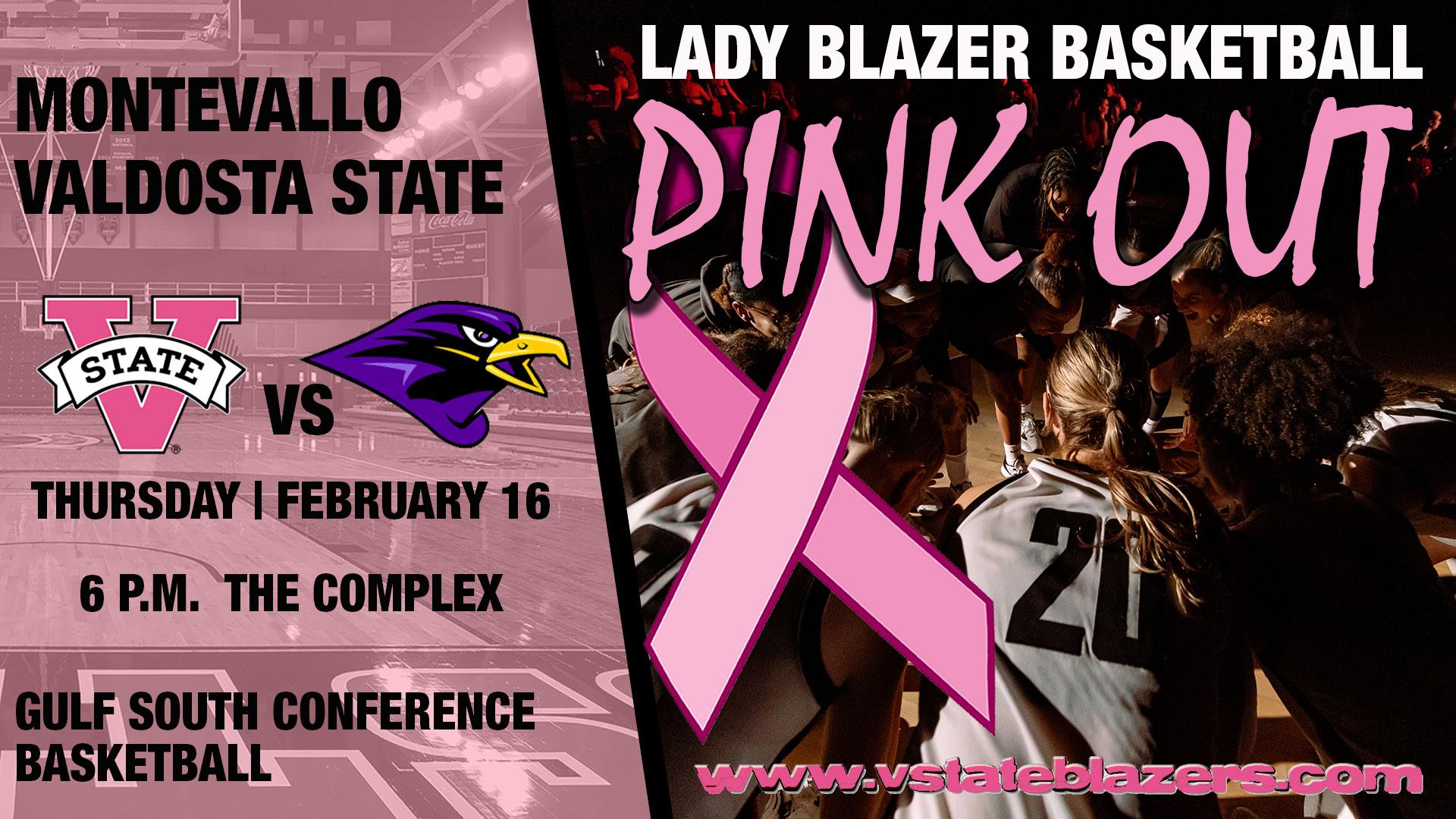
9 minute read
WEST FLORIDA ARGONAUT WBB WEST FLORIDA ARGONAUT MBB
VALDOSTA, Ga. – With a 17-4 record overall and a 16-3 mark in Gulf South Conference play, the Valdosta State women’s basketball team has clinched a home game in the upcoming GSC postseason tournament. VSU will face an opponent to be named later on Tuesday, Feb. 28 at either 6 p.m. (if doubleheader with the men) or 7 p.m. (if a single game) at The Complex for the “Super Tuesday” quarterfinal round game. Tickets for the Feb. 28 game will go on sale Saturday, Feb. 11, at halftime of both the Lady Blazer and Blazer home basketball games versus West Florida and at the conclusion of each game.
Ticket prices for “Super Tuesday” are $12 for reserved seats (all ages), $10 for adult general admission and $5 for youth. According to GSC rules, there is NO senior price for tickets. All current SEASON TICKET HOLDERS will have until Monday, February 27, 2023, at 1 p.m., to purchase their current seats. Season ticket holders MUST purchase their seats by either phone (229) 333-SEAT (7328) or in person at the Blazer Athletic Ticket Office. Ticket Office hours are 9 a.m. to 5 p.m., Monday-Friday. Tickets also will be on sale on Thursday, February 16, at halftime of both basketball games, as well as at the conclusion of the games and the same on Saturday, Feb. 18. Any reserved seats not purchased by Monday, February 27 at 1 p.m., will be released for purchase to the general public.
Advertisement
The Lady Blazers and Blazers host West Florida on Saturday in a key Gulf South Conference matchup for both teams. The women’s game is set for a 2 p.m. start, while the men’s game will tip at approximately 4 p.m. The Lady Blazers sit a half game behind Lee for second in the standings, while VSU sits a half game ahead of Union and a full game ahead of West Florida. On the men’s side, the Blazers currently are fifth in the standings and would need to finish in the top four at the end of the regular season to earn a home game for “Super Tuesday.”
The Gulf South Conference postseason tournament consist of the top eight teams in the conference with the top four seeds earning home games on Feb. 28. The winners then will advance to Birmingham, Ala., for the semifinals and championship on Mar. 4-5, at the Pete Hanna Center on the campus of Samford University. The winner of the championship will earn an automatic berth into the NCAA South Regional, scheduled for the following week.
The Complex serves as the home to the Valdosta State basketball programs as well as Blazer volleyball. One of the rowdiest arenas in the NCAA Division II ranks, The Complex seats 5,350 fans for each Blazer home event. The venue nearly reached it’s capacity during the 2009-10 men’s basketball season, when a record 4,616 fans gathered on February 27, 2010 to watch Valdosta State take on the West Georgia Wolves.
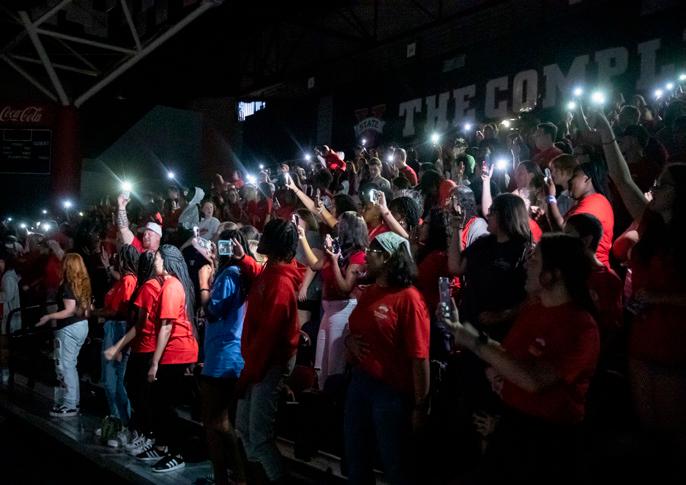
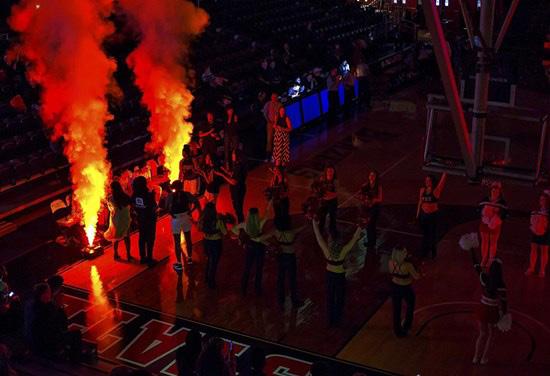
The Complex has undergone several renovations since its opening in 1983 and is today one of the top arenas in the Gulf South Conference. The most recent update and perhaps one of the largest to the facility was a complete renovation of the lobby area in 2013. Locker room renovations were also implemented that same year. Prior to the 2006-07 season, the lower level seating along each sideline was replaced with new cushioned armchair-style seats. The entire south side seating in the lower level, as well as selected rows on the north side, are reserved seating for Valdosta State’s season ticket holders. Meanwhile, the lower end zone seating area, as well as the entire upper bowl, features bench style seating.
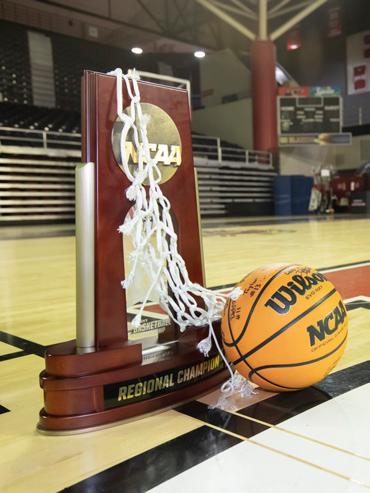
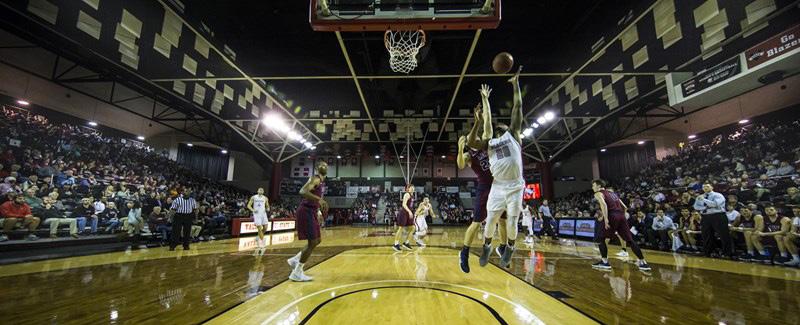
The benches for athletic events are located along the side sideline of the arena. Meanwhile, the west end zone bleachers are used to seat the Valdosta State cheerleaders, Red Hots dance team and pep band as well as the student-run Complex Crazies. The Complex also serves as a concert venue for select shows throughout the year, and graduation ceremonies are also often held in the arena.
In addition to the arena, The Complex also houses newly renovated locker rooms for Valdosta State’s two basketball teams, the volleyball program and the school’s two tennis teams. The south hall of the building also features two visiting team locker rooms as well as faculty locker rooms.
Offices housing Valdosta State’s Athletic Department are located along the east corridor of the facility while the University’s Kinesiology and Physical Education Department, a branch of VSU’s College of Education, is housed along the north hall. Classrooms, utilized by both the Athletic Department and KSPE Department, can also be found along both the north and south halls.
One of Valdosta State’s four Athletic Training Rooms, which features a full line of equipment for the needs of Blazer athletes, can be found along the north hall while the upper bowl of the arena also includes an indoor walking/running track.
Evidence of Valdosta State’s athletic dominance can be found throughout The Complex as the Athletic Department trophy case is located across the south hall from the Athletic Department offices. The trophy cases houses four of Valdosta State’s seven national championship trophies as well a a multitude of Gulf South Conference AllSport trophies and each of the school’s 24 GSC championship trophies along with numerous other momentos from VSU’s athletic past and present. Meanwhile, hanging in the rafters of the arena are banners commemorating some of the best teams in Valdosta State athletic history.
The home to the Valdosta State football and women's soccer programs is the Valdosta State Athletic Fieldhouse. The 41,000 square foot Fieldhouse opened in January 2009 at a cost of $5.8 million, giving the Blazer program one of the top athletic facilities in the nation.
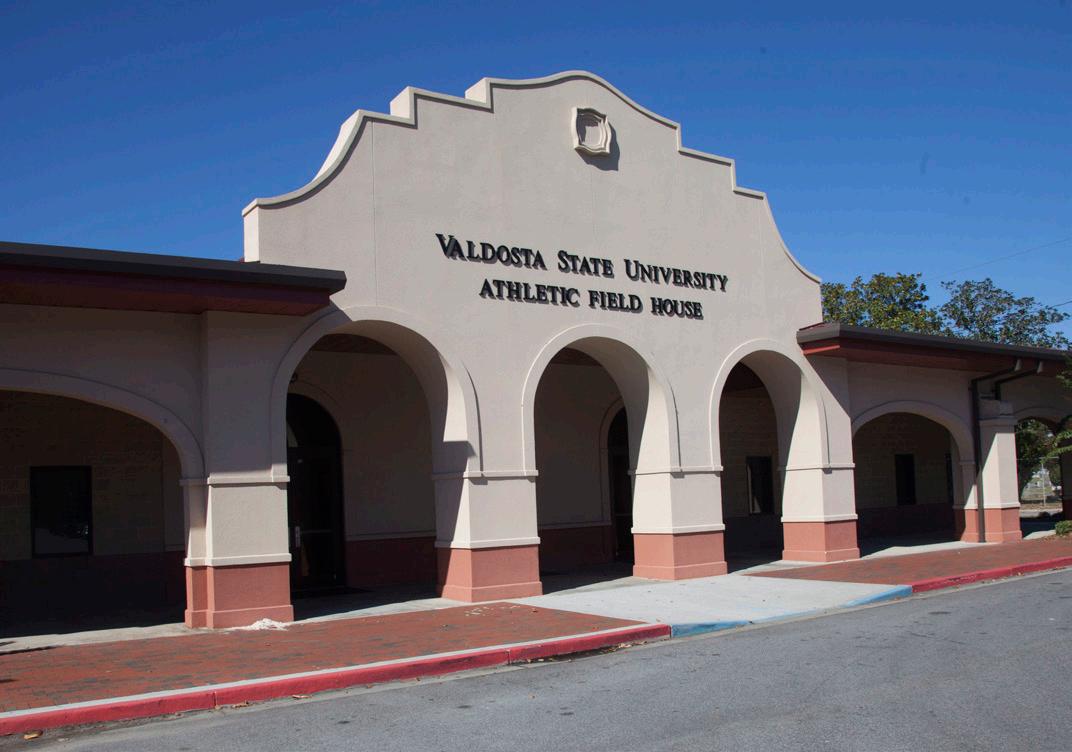
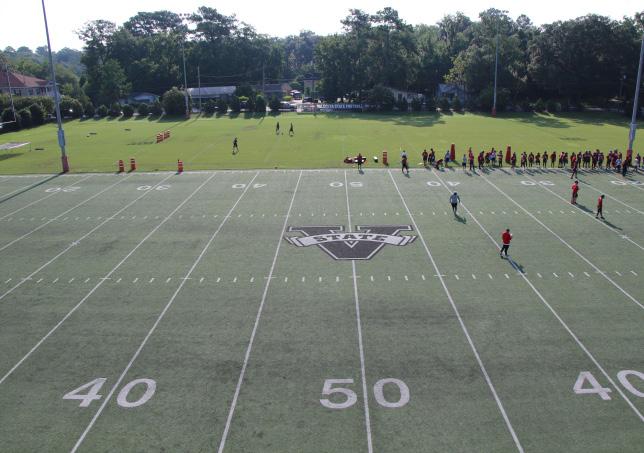
Beyond football and soccer, the fieldhouse also houses the 7,690 square foot Jessie Tuggle Weight Room and a 2,437 square foot state-of-the-art Athletic Training Room that is used by all VSU teams.
The Tuggle Weight Room, which encases nearly 10 times the space of its predecessor, is one of, if not the top, weight facilities among NCAA Division II schools nationwide. It featJessie Tuggle Weight Room ures 10 brand new eight-post stations as well as a reinforced medicine ball wall. New self-contained dumbbell stations were also added to the area while a 30-yard speed track was included in the design of the floor. The Jesse Tuggle Weight Room also features elliptical machines and two stationary bikes for cardio workouts and a built-in microphone/stereo system to aid the strength and conditioning staff while working with large groups of VSU athletes. Additionally, each of the 10 eightpost stations has also been pre-wired for video recording, which will be added in the near future, for further evaluation and instruction by the strength and conditioning staff. The newest addition to the facility are two Cognisens "caves," which allow for an increased mental training to provide Blazer athletes with an additional edge in competition. Valdosta State is the only university on any level in the nation to own the Cognisens machines, with additional owners including Manchester United and multiple NHL hockey teams.
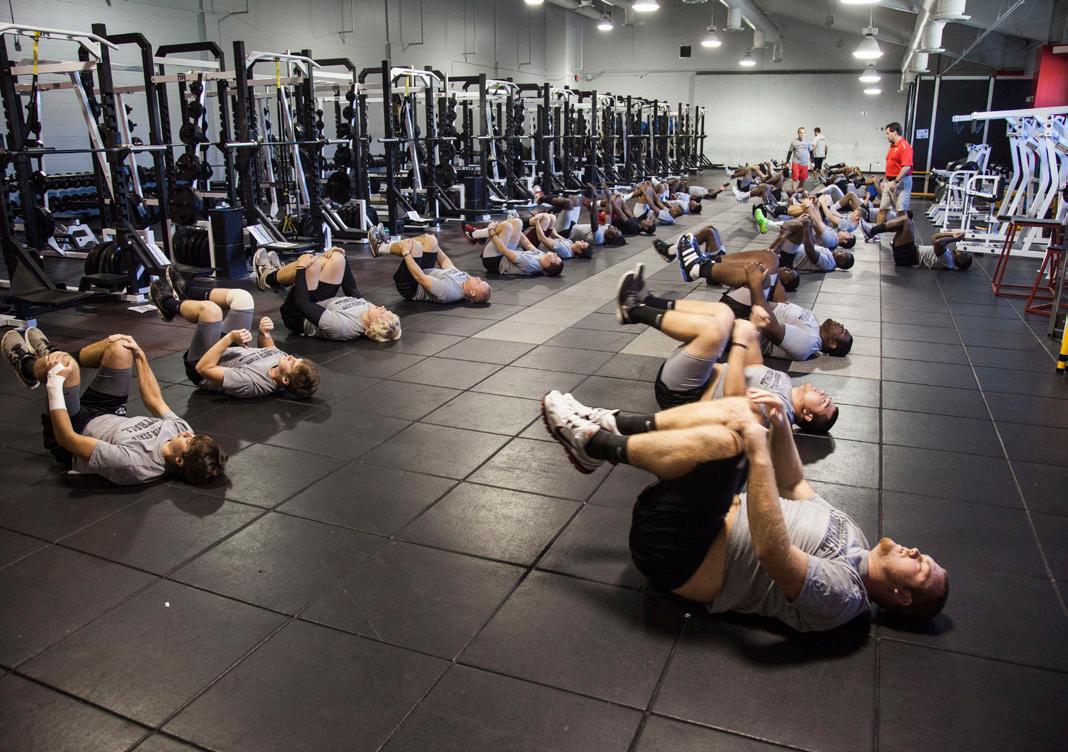
Next door to the Tuggle Weight Room is the Athletic Training Room. The area includes offices for the Valdosta State Athletic Training staff and a private physician exam room as well as a hydrotherapy room for rehabilitation work. The main Athletic Training area features six taping stations as well as six additional treatment areas plus a cardiovascular/rehabilitation area featuring stationary bikes.
Additionally, outside of the facility are two lighted football practice fields and a soccer stadium.
The Athletic Fieldhouse features many amenities that will aid the football team as it endures the rigors of a football season. A 3,265 square foot locker room is the centerpiece of the project and is lined with 126 lockers, enough to house all members of the VSU football squad. Adjacent to the locker room is a 2,100 square foot equipment room with secure “Football Locker Roompass-through” equipment bins that allow managers to address the equipment needs of all the Blazers while keeping each player’s equipment separated.
The remainder of the Athletic
Fieldhouse includes a 3,458 square foot office suite for the football coaches as well as 2,200 square feet of meeting rooms, each equipped with state-of-the-art video equipment. The academic needs of the student-athlete is also addressed as a 1,500 square foot computer lab is equipped with 19 computers.








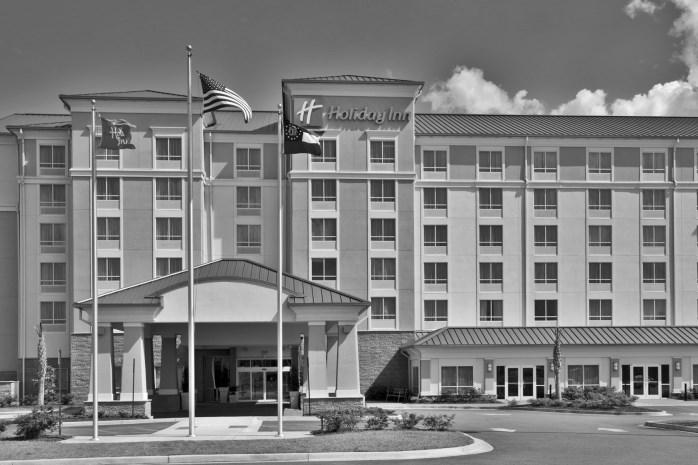


Academic excellence and a leadership role in NCAA’s Division II make the Gulf South Conference (GSC) something special. Entering its 51st year, the GSC is a charter Division II member that prides itself as one of the first conferences to be created and administered by its CEOs. We take pride in our 50-plus National Team Championships in 13 sports, one individual men’s cross country champion, five men’s golf individual champions, and one track and field champion, as well as more than 150 regional titles, especially because there is no sacrifice on the academic side, where GSC student-athletes graduate at a much higher rate than the general student body. The conference saw all 13 full-time institutions either earn a conference title or advance to NCAA Championship action in 2021-22. The GSC sponsors 19 sports, including 18 championship events. Official sponsored sports include baseball, men’s and women’s basketball, men’s and women’s cross country, football, men’s and women’s golf, men’s and women’s soccer, softball, men’s and women’s tennis, men’s and women’s track and field, and volleyball. Prior to the 2020-21 academic year, the conference officially added women's lacrosse after three seasons as an emerging sport. In the summer of 1970, six college presidents met to discuss athletics and when the meeting ended, a new league emerged—the Mid-South Conference. Delta State, Florence State (now North Alabama), Jacksonville State, Livingston (now West Alabama), Tennessee-Martin (UTM) and Troy State (TSU) were the charter members, but scheduling problems for the 1970-71 academic year limited the conference to only football. Southeast Louisiana (SELA) and Nicholls State (NSU) joined in 1971 and the league opened an office in Hammond, La., changed its name to the Gulf South Conference, and began championships in nine men’s sports. Mississippi College (MC) and Northwestern Louisiana (NWLA, now Northwestern State) joined in 1972 and two years later, NWLA left for Division I, followed by SELA and NSU in 1979. The conference continued with seven teams until 1981, when the CEOs admitted Valdosta State and West Georgia (1983). In 1991, UTM and TSU went Division I, briefly dropping the GSC back to seven members, but an aggressive expansion resulted in 10 new members: Lincoln Memorial (1992-93); Alabama Huntsville, Henderson State, Central Arkansas and Mississippi University for Women (MUW, 1993-94); West Florida (1994-95); and ArkansasMonticello, Arkansas Tech, Montevallo and Southern Arkansas (1995-96). Jacksonville State moved to Division I at the end of 1992-93. MC dropped to Division III at the end of 1995-96, and was replaced by Christian Brothers to keep the conference at 16 schools. In July 2000, the GSC welcomed Harding University and Ouachita Baptist University, making it the largest NCAA-playing conference at any level with 18 schools. MUW dropped its athletics program at the end of the 2002-03 season, decreasing the membership to 17. Central Arkansas reclassified to Division I and Lincoln Memorial moved to the South Atlantic Conference following the 2006-07 year. Montevallo’s departure for the Peach Belt Conference dropped the number to 14 in 2009-10. North Alabama completed its final year with the GSC in 2017-18, as the Lions accepted an invitation to go Division I and join the Atlantic Sun Conference.
The GSC moved away from divisional play after the 2010-11 season after its six Arkansas members broke away, dropping the membership to eight. The league implemented a five-year expansion plan in 2012 resulting in the addition of new members Shorter University (2014-15), Union University (2014-15), Lee University (2015-16) and Auburn University at Montgomery (2019-20) along with the return of Mississippi College (2016-17) and Montevallo (2017-18). Auburn Montgomery became a provisional member in 2017-18 as they advanced through the NCAA membership process. The Warhawks are on track to be a full member, eligible for all awards and postseason opportunities, in 2019-20. The conference also adopted affiliate memberships to boost its ranks, resulting in sport-specific members, Flagler (women’s lacrosse), North Greenville (football), Spring Hill College (men’s and women’s soccer and women’s golf), and Young Harris College (women’s lacrosse).
Basketball Participating Members
GSC National1971-2022Championships (54)
Baseball (6)
West Florida (2011)
Delta State (2004)
Jacksonville State (1990, '91)
Troy State (1986, '87)
Men's Basketball (3)
North Alabama (1979, '91)
Jacksonville State (1985)
Women's Basketball (7)
Delta State (1975, '76, '77, '89, '90, '92)
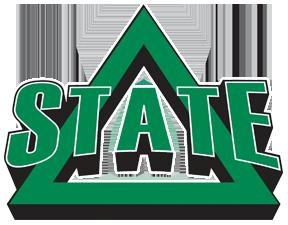
Southeastern Louisiana (1977)
Football (13)
Valdosta State (2004, '07, '12, '18)
Delta State (2000)
West Alabama (1971)
West Florida (2019)
North Alabama (1993, '94, '95)
Jacksonville State (1992)
Troy State (1984, '87)
Men's Golf (5)
West Florida (2001, '08)
Troy State (1976, '77, '84)
Lee (2022)
Women's Golf (3)
Troy State (1984, '86, '89)
Women's Gymnastics (2)
Jacksonville State (1984, '85)
Men's Hockey (2)
Alabama-Huntsville (1996, '98)
Women's Soccer (2)
West Florida (2012)
Christian Brothers (2002)
Softball (2)
Valdosta State (2012)

North Alabama (2015)
Men's Tennis (6)
West Florida (2004, '05', '14, '17)
Valdosta State (2006, '11)

Men's Track and Field (1)
Southeastern Louisiana (1975)
Women's Volleyball (1)
North Alabama (2003)
* Mississippi College vacated national title in 1989 / Men's Hockey not GSC Sponsored Sport


